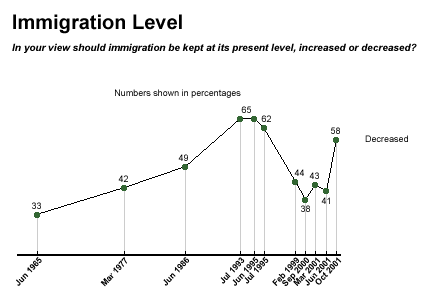Recently released Census Bureau data show that legal immigration accounted for more than one-quarter of the total population increase in the U.S. during the 1990s. The foreign-born population in the U.S. has increased significantly over the past three decades as a result of large-scale immigration, primarily from Asia and Latin America. According to Immigration and Naturalization Service (INS) figures, 7.6 million people attained legal permanent residence in the U.S. between 1991 and 1998 -- an amount equal to peak levels of immigration early in the 20th century.
Americans have historically held mixed opinions about immigration, but the level of opposition has been increasing over the past few months. According to a January 2002 Gallup poll*, two-thirds of Americans (66%) said they were dissatisfied with the current level of immigration in the U.S. today, and 58% said they would like to see that level decreased. In January 2001, the public was more receptive to immigration. At that time, 55% were dissatisfied with the level of immigration and only 45% said they wanted to see it decreased.
The obvious tendency is to blame the Sept. 11 attacks for the shift in public sentiment. Public monitoring of foreign-born visitors to the U.S. has become a high-profile issue. The terrorists who perpetrated the Sept. 11 attacks were not U.S. citizens, but several of them had been living in the U.S. for years, and the subsequent attempted terrorist attack by Richard Reid, the British citizen who attempted to board an airplane with explosives in his shoe, was committed on his trip into the U.S.
Indeed, the poll numbers on legal immigration did shift following the attacks. In mid-June 2001, another poll question showed that public opinion was evenly divided between those who wanted immigration levels decreased (41%) and those who thought they should be maintained at their present level (42%). When that question was next asked in October, 58% said immigration levels should be decreased, up 17 percentage points from June. Only 30% felt it should be kept at its present level. Further, in October, about half of Americans (49%) supported the idea of requiring Arabs traveling in the U.S., including those who have become U.S. citizens, to carry special identification, while an equal percentage were opposed.

But the current economic slump may be another contributing factor in American attitudes toward immigration. Historically, feelings about immigration tend to be closely related to developments in the nation's economy. When the economy is strong, Americans tend to be more supportive of immigrants entering the U. S. and sharing their prosperity -- but when it is weak, the public mindset shifts to a more isolationist stance.
In June 2001, as media speculation about a possible recession was spreading, 31% of Americans said that immigrants have a negative impact on the number of job opportunities available to them and their families, while 15% felt that immigrants increase job opportunities and 50% think they don't have much effect on job opportunities. Opinions were evenly divided regarding the impact of immigrants on the economy in general, with roughly one-third of those questioned (32%) indicating that the immigrants make the economy better, one-third (32%) saying they make it worse, and the remaining one-third (31%) saying immigrants don't have much effect on the economy.
Interestingly, data collected in June 2001 found that, when asked for a general assessment, most Americans believe immigration has had a generally positive effect on the country. Three-quarters of Americans (75%) believe immigration has been constructive for the U.S. in the past, and 61% agree that immigrants provide a special service to our society with their different cultures and talents. However, Americans tend to become more critical when asked about specific effects that immigration has had on the country. Specifically, 50% of Americans feel that immigrants make the crime situation in the U.S. worse, 46% believe that they make the tax situation worse, and 40% feel that they decrease the quality of public schools.
* Results are based on telephone interviews with 1,015 adults, aged 18+, conducted Jan. 7-9, 2002. For results based on this sample, one can say with 95% confidence that the margin of sampling error is +/- 3 percentage points.
